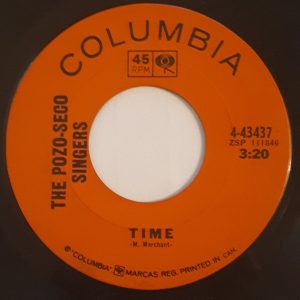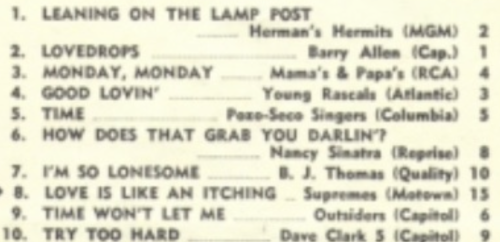#18: Time by the Pozo-Seco Singers
City: Edmonton, AB
Radio Station: CJCA
Peak Month: May 1966
Peak Position in Edmonton: #5
Peak position in Vancouver: #32
Peak Position on Billboard Hot 100: #47
YouTube: “Time”
Lyrics: “Time”
In 1964, baritone singer Don Williams and tenor Lofton Kline were a Corpus Christi singing duo that went by the name of The Strangers Two. They heard 17-year-old Ray High School student, Susan Taylor, performing solo at the Del Mar Hootenannies. Lofton recalls, “Don was married and had a little one to support, and was working at Pittsburgh Plate Glass. I was going to Del Mar College in Corpus. The college had a hootenanny scheduled and Don and I were asked to entertain.” After they met Susan Taylor, as Lofton tells it, ““We asked her to come over and practice with us the following week. She did…and the rest is ‘history.’” Susan’s alto voice blended perfectly with Don’s baritone and Lofton’s tenor.
Lofton remembers: “Susan’s boyfriend at the time was a geologist working for Coastal State Gas Corporation. ’Pozo Seco’ was stamped on several folders on a table at the house where we first started practicing. It’s an oil field term used to label an unsuccessful drill, i.e., a ‘dry hole.’ We were in a ‘dry hole’ ourselves, so to speak. Don was a shift worker at PPG. Susan was still contending with high school. I had just started college. We were looking for a name for our group and all liked the unusual term, ‘Pozo Seco.’ We added ‘Singers’ and hit the road! We thought it was very catchy and knew we’d get a lot of questions about it as our careers progressed.”
A former member from Susan’s earlier singing group, the Corpus Christi Folk Music Society, was named Mike Merchant. He had recently written a tune called “Time.”

Michael Merchant was raised in Missoula, Montana. He studied at the University of Pennsylvania. In addition to his freelance work as a singer-songwriter, Merchant worked as for the U.S. Post Office, as a yoga instructor and Cryptographic Electronics specialist at US Army Signal Corp. He also was an Electrical Technology Instructor at Houston Community College-Central in Houston, Texas. He had one solo single release titled “Military Minor Blues”.
“Time” is a song sung by someone observing contrasts in life: people who various run, crawl or “don’t even move at all.” Those who “never die and some never live.” After noticing people around them, the narrator begins to shift and notice the connection/lack of connection with others in the second verse:
Some folks treat me mean, some treat me kind.
Most folks just go their way, don’t pay me any mind.
The introspective song moves to self-reflection in the third verse:
Sometimes I’m satisfied, sometimes I’m not.
Sometimes my face is cold, sometimes it’s hot.
Sunset I laugh, sunrise I cry,
At midnight I’m in between and wondering why.
“Time” was covered for album tracks by Mel Torme, Nancy Sinatra, Cher, Lenny Welch, Cliff Richard, Glen Campbell, Lindsay Buckingham, Rod McKuen, George Hamilton IV, the soul group The Capreez, Mike Merchant wrote a song titled “I’ll Be Gone” that was recorded by George Hamilton IV.
“Time” peaked at #3 in Fort Worth (TX) and Orlando, #4 in San Antonio (TX), #5 in Edmonton (AB) and Troy (NY), #7 in Burbank (CA) and Erie (PA), #8 in San Diego, Denver, and Oklahoma City, #9 in Los Angeles and Salt Lake City, #10 in Houston, Boston, Louisville (KY), and Akron (OH), and #11 in Portland (ME).
As “Time” began to chart, the Pozo-Seco Singers appeared on The Lloyd Thaxton Show on March 15, 1966.
With the regional success of “Time” in a number of radio markets, the Pozo-seco Singers were off to record in Nashville. They had a new manager named Albert Grossman. Things really started to happen. The Pozo-seco Singers soon appeared on TV with Nancy Wilson, The Smothers Brothers, and in concert with Ian and Sylvia. The trio also performed for a two week gig with Gordon Lightfoot in Greenwich Village. One of the tracks on their second album, I Can Make It With You, was Lightfoot’s “Ribbon Of Darkness”.
In 1966, their third single release, “I Can Make It With You”, climbed to #32 on the Billboard Hot 100. While their followup single was a flop, their fifth single release, “Look What You’ve Done“, also made it to #32 on the Billboard charts. In October 1967, the group appeared on The Mike Douglas Show.
Soon after the release of I Can Make It With You, Lofton Kline left the Pozo-seco Singers. He didn’t get along with producer, Bob Johnston. Kline also found the new touring schedule grueling. Rob Shaw became the new tenor voice in the trio. Shaw introduced a song he’d written called “I Believed It All.” It was popular in live concerts and the trio pitched it to Bob Johnston. However, the producer rejected it for an A-side, preferring “Excuse Me, Dear Martha” for single release. That release stalled at #102 under the Billboard Hot 100. DJ’s started flipping the single and “I Believed It All” made it to #96 on the Hot 100 despite no promotion, and #8 on the Billboard Easy Listening chart in May 1967. They also released “Morning Dew” as a single that year.
Friction with Bob Johnston led the Pozo Seco Singers to get a new producer for their next album, Shades Of Time. However, they were now just Don Williams and Susan Taylor and got backing vocals from the Canadian band, The Paupers, including Skip Prokop who went on to form the Canadian band Lighthouse.
As a Pozo Seco duo, Don Williams and Susan Taylor released a fourth album in the spring of 1970 titled Spend Some More Time With Me. However, according to Tom Pickels background article on the Pozo-Seco Singers website, Susan Taylor recalls that the timing of the album was bad. The Kent State shootings in Kent, Ohio, “took the air out of the folk movement,” as Taylor tells it. Much of the innocence and optimism of the folk songs they were singing no longer seemed to fit the changing times.
Don Williams went on to a very successful recording career in Country music. He chalked up 17 #1 hits on the Billboard Country charts and over twenty other singles on the Top Ten. Between the mid-70’s and early 80’s, Williams received awards for Male Vocalist (of the year) from both the County Music Association in Nashville and the Academy of Country Music in Los Angeles.
Susan Taylor went on to bill herself as Taylor Pie. She moved to New York City and sang in venues like Folk City and The Bottom Line. Bette Midler heard her play and Taylor Pie offered to buy her a drink. Midler replied, “I need to buy you a drink, this place is a dump.” Midler went on to perform Taylor Pie’s song, “Back In The Bars Again”, on Midler’s 1975 tour, Clams on the Half Shell Revue. Taylor Pie moved to the Berkshires in the 80’s and performed with Arlo Guthrie and others. Based in Liberty, Tennessee, for the past few decades, she has continued to tour as a solo artist. In 2015 was inducted into the Country Music Hall of Fame.
December 6, 2023
Ray McGinnis
References:
Tom Pickels, Pozo Seco – Shades of Time, pozosecosingers.com
About Pie, Taylor Pie.com
Ashley Lasimone, “Bob Johnston, Producer for Bob Dylan, Johnny Cash & More, Dies at 83,” Billboard, August 15, 2015
Irv Lichtman, “Songwriter/Exec Wes Ferrell Dies: Worked On Many Early Rock Hits,” Billboard, March 16, 1996.
Beatrice Nakibuuka, “She Only Calls Me When She Wants Money,” Daily Monitor, London, UK, July 19, 2018
Stephen L. Betts, Don Williams, Country’s ‘Gentle Giant,’ Dead at 78 – Distinctive Stylist Scored Chart-Topping Hits with “Tulsa Time” and “It Must Be Love”, Rolling Stone, September 8, 2017.
The Pozo-Seco Singers, The Lloyd Thaxton Show, March 15, 1966.
The Pozo-Seco Singers, The Mike Douglas Show, October 3, 1967.

CJCA 930-AM Edmonton (AB) Top Ten | May 8, 1966

Leave a Reply